Serving the poorest
Waram Sri Lanka II:
Street urchins have been a social issue which has
grabbed the attention of academics and sociologists for a considerable
period of time. Though numerous programmes have been introduced,
inconsistence in the programmes has rendered most of them either
impractical or unsustainable.
|
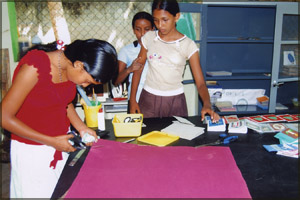
Inmates - all kept occupied in their new life. |
Street urchins have been a social issue which has grabbed the
attention of academics and sociologists for a considerable period of
time. Though numerous programmes have been introduced, inconsistence in
the programmes has rendered most of them either impractical or
unsustainable. With the setting up of Waram Centre, a community facility
ray of hope has been shed on the lives of street urchins. The centre is
equipped with audio visual facilities and other amenities to make life
easy for the street urchins
Flocks of homeless street urchins get together at a certain building.
It looks like their own though well furnished with radios, cookers and
even toys. After a hectic day, of earning a little to fill their
tummies, now it is time to have a respite. While some are listening to
the radio others are busy with cooking. Still a few may be listening to
their favourite songs from a cassette player.
This may be what Professor Harendra de Silva saw a few years ago when
he was on a visit to Bangladesh. It was a welfare centre dedicated to
street children and managed by an NGO.
Homeless and helpless innocent ones’ smiling faces inspired Prof. De
Silva who was then Chairman, National Child Protection Authority.
|
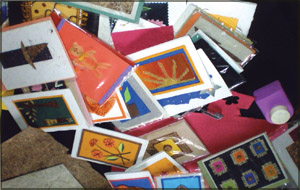
Greeting cards turned out by Waram Centre inmates - urchins and
coastal poor kids who have been shown the way by the Waram
Centre. |
“Why can’t we do the same for our children of similar fate. There are
hundreds of little ones moving aimlessly here and there in busy urban
streets, mostly unnoticed”, he thought.
No sooner he returned, Prof. De Silva decided to put his thought into
practice. He worked promptly and was able to get necessary financial
support from the World Bank.
His choice was Pettah, Colombo where the largest number of street
children was recorded. Rather than confining to the Bangladeshi example
he focused on empowering and skill development too. So Prof. De Silva’s
welfare centre included TVs, DVD players and even computers. It was a
tremendous success at the beginning.
Encouraged by the results, he moved on to expand his project to other
areas. This time Prof. De Silva’s choice was not street children but
similarly fated poor children along the coastal belt. Like street
urchins in urban areas, poor children in coastal areas are prone to
various forms of child abuse.
They go astray at a tender age because there is no proper guidance on
the one hand and no sources of entertainment either at their homes.Thus
children and youth centres were expanded to southern areas like
Hikkaduwa, Payagala, Weligama and Anuradhapura in the central north.
“There is certain similarity between street urchins and poor children
in the coastal areas”, says Prof. De. Silva.
“Most of the poor children in coastal areas go astray just like
street urchins. Poverty drives them towards abuses and corruption at
their gullible age. Many of them do not have TVs or radios at home.
Where there is no entertainment and guidance it is little wonder that
children get addicted to corrupted habits. In a move to protect them and
provide not only entertainment but guidance we decided to expand our
project to coastal areas.”
Once children were frequent with the centres the professor focused on
skill development. Teenagers or grown up children were trained in paper
recycling and making greeting cards while smaller ones enjoy watching TV
or DVD.
|
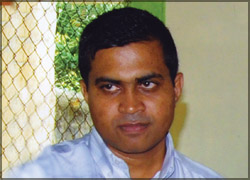
Ruchira Liyanage - the Waram Sri Lanka Coordinator. |
|
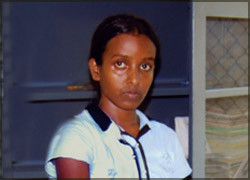
Sandaraj Shivanti Devika - the instructor at the Hikkaduwa Waram
Centre. |
It is said that good things are short lived. Professor De Silva’s
project also started to face problems as he retired from NCPA in 2005.
Due to the lack of patronage the project came to a standstill.
Unfortunately it was high time that coastal children needed protection
and shelter because the tsunami had devastated their lives.
Seeing the need of the hour Prof. De Silva’s humane heart could not
turn a blind eye. He sought after the private sector in order to get
sponsorship. Finally the Suntel Group offered to help him and it was how
Waram Sri Lanka (renamed) children and youth centre was started in Galle.
Hand made paper and greeting card programmes were soon to follow. Yet
there were difficulties in providing the required technical know how.
“There was no one to teach us hand made paper manufacturing. So I
read books and surfed the Internet in order to gather information.
Dozens of children from fishing families began to come, mainly to watch
TV. We provided them with the opportunity of not only watching TV or DVD
but also learning information technology”, Prof. De Silva added.
Waram Centres’ elegant greeting cards were then seen in urban shops.
However, most of those who bought them did not know the story behind
them. Income earned by the sale of these cards was distributed
proportionately among the children.
Each child’s earnings was banked in his/her name. Thus Waram centre
turned out to be everything to the poor children - entertainment,
education, vocational training and source of income.
Impressed by the success story of the Galle Centre, in 2006, two NGOs
named Roterkeil and Neswaerma offered to open up two more centres at
Dadalla and Hikkaduwa respectively. Then skill development initiative
expanded from greeting cards to tailoring, dress making and handicrafts.
In addition, school classes were started free of charge, for English,
computer literacy and aesthetic subjects like music and dancing. It
opened up job opportunities for nearby youth with proper qualifications
as teachers.
As the Waram Centres gathered momentum not only poor fisher folk but
also middle class families started sending their children in. Waram
centres welcomed all those who stepped in and focused on skills
development.
“I am coming from a very poor family. My parents are estate workers.
They could not afford my studies. I came here to attend the free
computer class and learned paper recycling and how to make greeting
cards too.
Now I can earn some money from greeting cards. Sometimes my monthly
earnings exceeds Rs. 5,000. It is a great relief for my family. Now I
can save something for my future”, said Sandanaraj Shivanti Devika, 24,
who is now an instructor at Hikkaduwa Waram Centre.
As Waram centres went on smoothly for sometime, the need for
expansion was felt. The number of children at the centres was on the
increase though building premises and infrastructure were inadequate.
Prof. De Silva had difficulties in finding a proper sponsor.
Certain offers came from the private sector, but on condition that
their products be marketed along with children’s greeting cards. All
such offers had to be turned down since it was against the founding
concept. Sponsorship issue existed until last year when Dialog Telekom
extended its helping hand unconditionally.
“Dialog’s offer came in without any business interest.
They gave us a furnished building and necessary machinery to carry
out paper recycling and greeting cards program at Hikkaduwa Centre. Now
we are capable of manufacturing sufficient paper material for making
greeting cards at all three centres. Through the new additions the
program will now include training in screen-printing which will also be
used in the card making process” Prof. De Silva said.
|
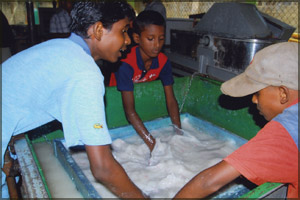
Kids at work |
Since Waram Centres now, receive financial support through Dialog
Telekom’s Change Trust Fund even Dialog subscribers can contribute to
the welfare of these poor children. The Change Trust Fund was
established in 1999 and is Dialog Telekom’s key community service
initiative. The Fund itself is powered through an innovative fund
raising method where post-paid subscribers are invited to donate 0.5% of
their monthly bill up to a maximum of Rs. 25 which is thereafter matched
1:1 by Dialog Telekom. The collection is then used for various community
service projects aimed at uplifting lives islandwide.
The Change Trust Fund also involves employees from Dialog Telekom in
all of its initiatives on volunteer basis.
“I would like to thank Dialog Telekom and its subscribers who
willingly participate in this endeavour” with a high note of gratitude
Prof. De Silva said.
Commenting on the Dialog Telekom Change Trust, Mothilal de Silva,
Group Chief Corporate Officer, Dialog Telekom said “through the Dialog
Change Trust Fund we have strived to uplift the lives of many segments
of society who have not had a voice of their own.
Being a relatively young Company itself we recognise the strength and
power that is inherent in the Sri Lankan youth today and as a Company we
seek to harness that strength. We are honoured to be partnering Waram
Sri Lanka in this effort to uplift the lives and livehood of the youth
in the South through this Welfare Centre project”.
“Lots of children, big and small, are coming for free education and
entertainment at our centres. While small ones are playing, grown up
ones engage in the greeting card program. Presently 25 children take
part in greeting card program in Hikkaduwa and with all the three
centres put together there are 100 children contributing greeting cards.
Initially we guided them to make cards at home using waste paper
materials. But now, since we have our machinery and buildings, greeting
card industry is going on a professional scale here. Our annual
production is about 2000 greeting cards while each worker (child) is
capable of making a monthly income of around Rs. 1,000”, says Ruchira
Liyanage, Waram Sri Lanka’s Coordinator.
“Initially, our aim was to empower the poverty stricken youth to give
them confidence. Through this program we expect them to be able to stand
upright on their own. And we are planning to start an environment
friendly paper bag project shortly”, Professor Harendra De Silva
explained.The only challenge now is to find a competitive market for the
elegant greeting cards, cushion covers and other handcrafts made by
skilled youth at the Waram centres. Yet it will not be a challenge for
long, for the centre receives support from young men and women like
Shivanti who got a new lease of life from the Waram centre itself.
Already, number of women engage in self employment as a result of
Waram centres.
“One day I want to start my own business”, Shivanti smiles. Let’s
pray for her dream. |

